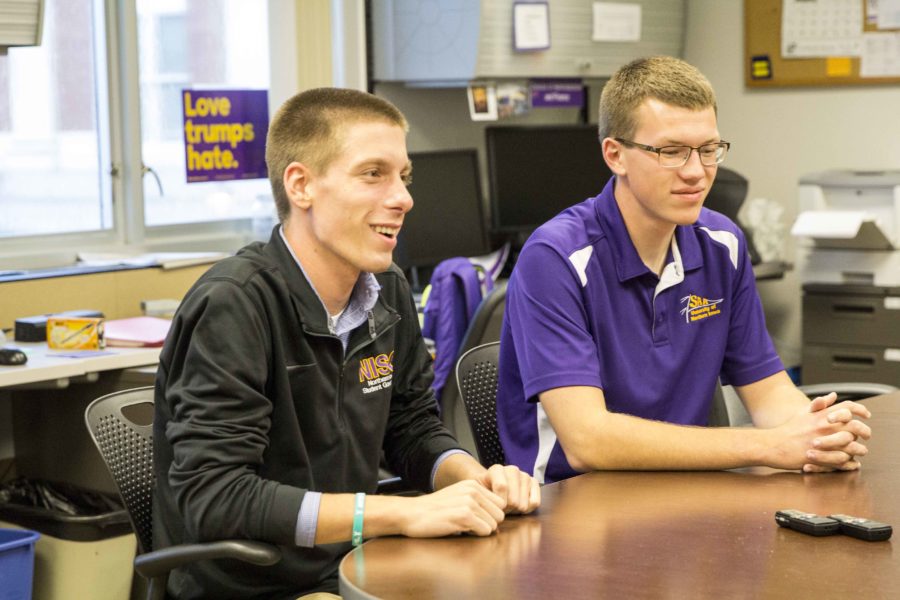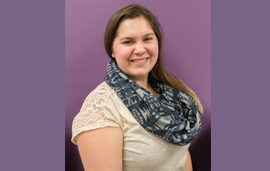Hunter & Avery plan
NISG President Hunter Flesch and Vice President Avery Johnson discussed their plan for the year, including their upcoming mental health awareness week, dubbed ‘You Matter at UNI’
Oct 10, 2016
After UNI faced a tough year with issues such as diversity and mental health coming to the forefront, the student body elected Hunter Flesch, junior elementary and middle level education major, and Avery Johnson, junior English major, as Northern Iowa Student Government (NISG) president and vice president, respectively. Flesch and Johnson campaigned with the slogan “Stronger Together,” with the goal of working with other people.
“It’s not [just] about us two,” Flesch said. “Yes, we are serving in the president and vice president roles, but it takes an entire campus to get around ideas.”
During the debate last year for president and vice president, Flesch and Johnson emphasized the need for greater efforts in the area of mental health. This came shortly after the Student Health Center announced student fees on some psychiatric services. Flesch detailed their planned initiative to help fight the stigma of mental illness on campus. This will include a week devoted to raising awareness, to be held from Oct. 24-28.
“Mental health awareness week – that’s going to be happening this year,” Flesch said. “We’re calling it ‘You Matter at UNI.’ It’s a campus of support; it’s not just one or two people.”
“I think after everything that happened last year, it was a hard year for a lot of students,” Johnson said. “We wanted to run on a platform – run a campaign – that could really help students.”
Flesch said students will know awareness is being raised about mental health whenever they see the color lime green. According to Flesch, lime green is the national color for mental health awareness. Flesch detailed plans for t-shirt drives and bracelet drives during the week of Oct. 24 through Oct. 28, which would raise money to go directly back to students.
The money raised would be allocated toward the existing fund that helps students who are unable to pay for the psychiatric care fees assessed by the Student Health Center, or those who do not have insurance that will cover the fees.
Flesch noted that the Monday of that week would include a flag drive, saying, “You can write a message of support or of somebody you lost, and stick it in Lawther field.” Flesch and Johnson explained their reasoning for the planned events, emphasizing the need for visibility for mental health issues on campus.
In addition to mental health, the events of last year shined a spotlight on the issue of diversity on campus.
Johnson, who serves as the co-chair for the Advisory Council of International Affairs (ACIA), explained that one of the first things the ACIA is trying to do is further connect international students to campus.
“We want to see what issues they face that they can bring before this council and see if we can solve them on campus,” Johnson said. “They’re very driven students and they want to be as involved as any other student, and we would love see them get [connected] in any way they can.”
Johnson went on to explain that white students, who are in the majority on campus, were able to engage with the Center for Multicultural Education and International Students (CME) through the summer orientation staff, which introduced incoming students to the CME and some of the events they host.
“We made sure, as summer orientation staff members, to explain all the resources that we have available and the programs that go on,” Johnson said. “[We talked] about transitioning to college and how it’s going to be different from high school and how you need to take this opportunity to expand your horizons, to grow, to become a better person.”
According to Johnson, these diverse experiences also make UNI students more employable, which is another reason to get involved with diversity on campus. Johnson said a committee is currently being formed to do further research on the possibility of a diversity exit requirement. Flesch and Johnson said the more they can get students engaged, the better, and that student engagement is their primary goal this year.
















